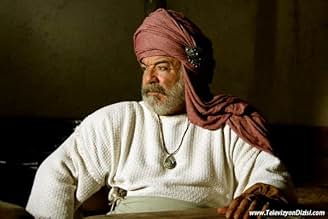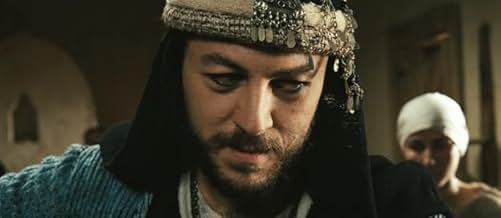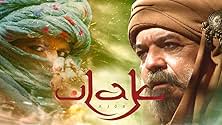IMDb-BEWERTUNG
6,7/10
5038
IHRE BEWERTUNG
Füge eine Handlung in deiner Sprache hinzuIn a place where there is no time, a traveler comes to an unnamed village where we do not know where on the map. The weary traveler is a messenger. They have stories to tell, words to say.In a place where there is no time, a traveler comes to an unnamed village where we do not know where on the map. The weary traveler is a messenger. They have stories to tell, words to say.In a place where there is no time, a traveler comes to an unnamed village where we do not know where on the map. The weary traveler is a messenger. They have stories to tell, words to say.
- Auszeichnungen
- 2 Gewinne & 9 Nominierungen insgesamt
Zuhal Gencer
- Cemile
- (as Zuhal Gencer Erkaya)
Yagiz Atakan Savas
- Ferhat
- (as Atakan Yagiz)
Empfohlene Bewertungen
this is a timeless film and a timeless story, full of hope and humanity. the actors are magnificent, especially the children and the storyteller.
altogether a beautiful experience that instills hope in everyone. in a way it is very realistic and based in a seemingly real village. then the film shifts between two stories which are linked and share some actors.
it is encouraging because it exposes evil-doers and gives hope that ethical behavior has still a great value. another plus is that the film shows a life-style of old with beautiful costumes and embellishing of the women's face and is set in a rural place which makes you quite nostalgic.
altogether a beautiful experience that instills hope in everyone. in a way it is very realistic and based in a seemingly real village. then the film shifts between two stories which are linked and share some actors.
it is encouraging because it exposes evil-doers and gives hope that ethical behavior has still a great value. another plus is that the film shows a life-style of old with beautiful costumes and embellishing of the women's face and is set in a rural place which makes you quite nostalgic.
Set in an unspecified medieval period, ULAK centers on Zekeriya, a doctor (Çetin Tekindor) who visits a village and begins to tell mysterious stories of the past, present and future to a group of children and adults. The stories focus on the power of God, the importance of remaining true to oneself and the need to overcome tyranny. The center of his tales is a crippled character Murad (Ömer Hüsnü Turat) who possesses some kind of spiritual power despite his disability.
Zekeriya's presence within the community immediately causes suspicion: what kind of power does he have over the children? For the village elders, accustomed to wielding their patriarchal power over their women and their offspring, he represents a subversive force, and therefore needs to be removed. The only snag is that he possesses the kind of resilience that is infectious - so infectious, in fact, that he encourages the children to resist their parents. Young Ferhat (Atakan Yağız) offers a case in point - despite his father's attempts to beat him into submission, he remains unbowed, and eventually departs with Zekeriya to a better world.
Part-fantasy, past religious epic, Çağan Irmak's film underlines the importance of being true to oneself, even if life's circumstances turn against you. This is way Zekeriya preaches, using his autobiographical experiences with Murad as an example. Tyrannies will never survive in a world whose inhabitants understand the existence of a higher power in whom they can trust. Such views are not only religiously important, they have an intimate bearing on contemporary politics. The film's ending is particularly satisfying, as the children and the believers go forth into a promised land, leaving the former tyrants and their families to die. ULAK is particularly harsh on those who simply follow popular sentiment without understanding anything about themselves or the societies they inhabit. They are at once the least intelligent yet most dangerous of people.
To be honest, some of the action is a little sentimental, adumbrating some of Irmak's later work such as THE SLEEPING PRINCESS (PRENSES'IN UYKUSU), especially towards the end of the the film when Zekeriye reveals the ending to his tale to the accompaniment of swirling violins on the soundtrack. There is also the question of the film's epigraph, dedicated to all children with the capacity to dream; on this view, Irmak suggests that all adults have somehow been corrupted and it is incumbent on the younger generation to create a better world. This might be true, but it suggests a view of childhood with its roots in European Romanticism rather than spirituality.
Zekeriya's presence within the community immediately causes suspicion: what kind of power does he have over the children? For the village elders, accustomed to wielding their patriarchal power over their women and their offspring, he represents a subversive force, and therefore needs to be removed. The only snag is that he possesses the kind of resilience that is infectious - so infectious, in fact, that he encourages the children to resist their parents. Young Ferhat (Atakan Yağız) offers a case in point - despite his father's attempts to beat him into submission, he remains unbowed, and eventually departs with Zekeriya to a better world.
Part-fantasy, past religious epic, Çağan Irmak's film underlines the importance of being true to oneself, even if life's circumstances turn against you. This is way Zekeriya preaches, using his autobiographical experiences with Murad as an example. Tyrannies will never survive in a world whose inhabitants understand the existence of a higher power in whom they can trust. Such views are not only religiously important, they have an intimate bearing on contemporary politics. The film's ending is particularly satisfying, as the children and the believers go forth into a promised land, leaving the former tyrants and their families to die. ULAK is particularly harsh on those who simply follow popular sentiment without understanding anything about themselves or the societies they inhabit. They are at once the least intelligent yet most dangerous of people.
To be honest, some of the action is a little sentimental, adumbrating some of Irmak's later work such as THE SLEEPING PRINCESS (PRENSES'IN UYKUSU), especially towards the end of the the film when Zekeriye reveals the ending to his tale to the accompaniment of swirling violins on the soundtrack. There is also the question of the film's epigraph, dedicated to all children with the capacity to dream; on this view, Irmak suggests that all adults have somehow been corrupted and it is incumbent on the younger generation to create a better world. This might be true, but it suggests a view of childhood with its roots in European Romanticism rather than spirituality.
This film definitely has its own way of telling a story. While watching, it gives you the feeling of listening to a fairy tale, which I haven't felt for many years. I must admit that the film has religious implications, because of the story in the background, but they are not necessarily negative criticisms. By choosing children as the main audience in the "messiah story", this film separates itself from any other religious-story-telling films or books. The costumes, acting and conversations all have that fairy tale style as a whole. I see "hope" as the main theme of this film as "even an unrealistic hope can change people's lives". Please don't watch and judge this movie with your or others belief-defending opinions. It just shows the power of imagination. Also it is a good and a different step for Turkish cinema.
Another masterpiece from the one of most intellectual and creative directors of Turkey. Story is also by Irmak.
1- The incredible soundtracks that takes you away is by E.Reboutsika who won the World Soundtrack Award in 2006 by another Irmak movie "Babam ve Oglum" (My Father and My Son) 2- Cetin Tekindor presents one of the best actings I've ever seen. He paralyses the audience. Especially, the scene he begins to cry when he finishes his story and the children are talking about the Messenger they dream of.. 3- Story is very allegoric. No time and no place. And the presentation of this story is very original, since there are parts like "Dream of Ferhat", "Reality of Zekeriya", "Book of Mehmet" 4- Although lots of messages are given, the most emphasized is "The one who knows but keeps silence is as much guilty as the one who commits." In fact it seems to refer to the Military Regime started in 1980 and to the society that did not want to talk about it for years. Not only that, but also every society that stay silent against the evil kind. 5- The end is much more original. Story ends with "Dream of Saffet", which means it is your turn to dream about the end.
1- The incredible soundtracks that takes you away is by E.Reboutsika who won the World Soundtrack Award in 2006 by another Irmak movie "Babam ve Oglum" (My Father and My Son) 2- Cetin Tekindor presents one of the best actings I've ever seen. He paralyses the audience. Especially, the scene he begins to cry when he finishes his story and the children are talking about the Messenger they dream of.. 3- Story is very allegoric. No time and no place. And the presentation of this story is very original, since there are parts like "Dream of Ferhat", "Reality of Zekeriya", "Book of Mehmet" 4- Although lots of messages are given, the most emphasized is "The one who knows but keeps silence is as much guilty as the one who commits." In fact it seems to refer to the Military Regime started in 1980 and to the society that did not want to talk about it for years. Not only that, but also every society that stay silent against the evil kind. 5- The end is much more original. Story ends with "Dream of Saffet", which means it is your turn to dream about the end.
the atmosphere. the architecture. the emotion. the words who becomes pillars. the image of wise story teller. and the magic in a not comfortable manner. a film who could be window to memories. or rediscover of pure story, from classic Oriental recipes. but, step by step, scene by scene, you discover it be more than charming introduction in mythical universe. but a parable who remains the perfect manner to describe the present as just one of forms of past. the expectation. the force of dream. the fear. and the curiosity. the challenge. and the bitter words. and, sure, the large slices of silence. a film who is more a window to a lost world than a fairy tale's exposure. because it reminds the roots of the life. and the importance of its values.
Top-Auswahl
Melde dich zum Bewerten an und greife auf die Watchlist für personalisierte Empfehlungen zu.
Details
- Erscheinungsdatum
- Herkunftsland
- Offizieller Standort
- Sprache
- Auch bekannt als
- The Messenger
- Drehorte
- Produktionsfirma
- Weitere beteiligte Unternehmen bei IMDbPro anzeigen
Box Office
- Weltweiter Bruttoertrag
- 3.248.267 $
- Laufzeit1 Stunde 49 Minuten
- Farbe
- Seitenverhältnis
- 2.35 : 1
Zu dieser Seite beitragen
Bearbeitung vorschlagen oder fehlenden Inhalt hinzufügen























